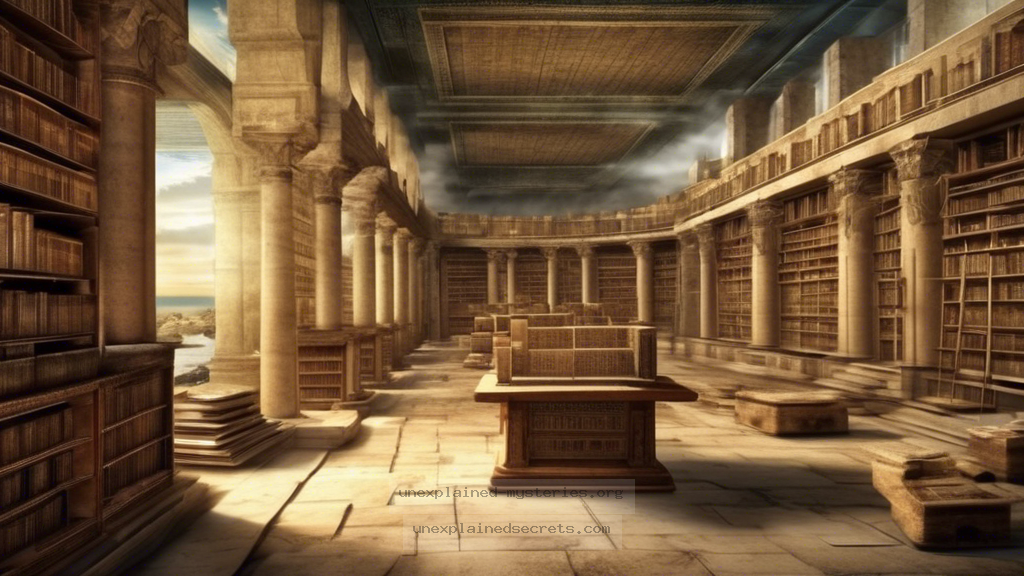What Happened to the Lost Library of Alexandria and Why Does It Matter Today?
What Happened to the Lost Library of Alexandria and Why Does It Matter Today?
The Lost Library of Alexandria stands as one of the greatest mysteries of the ancient world, representing not just a physical location but a symbol of knowledge and cultural heritage that was tragically lost to time. This question matters deeply in our quest to understand human history, the value of knowledge, and the fragility of cultural preservation. The library was more than just a repository of scrolls; it was a hub of intellectual exchange that housed works from various civilizations. Exploring the fate of this legendary institution can provide insights into how societies prioritize knowledge and the consequences of its loss.
Historical Context of the Library of Alexandria
Founded in the early 3rd century BCE in Alexandria, Egypt, by Ptolemy I Soter, the Library of Alexandria was part of a larger institution known as the Mouseion, dedicated to the Muses and the pursuit of knowledge. It is estimated that the library housed between 40,000 to 700,000 scrolls, containing works from various disciplines including literature, philosophy, mathematics, and sciences. Scholars like Euclid and Eratosthenes were associated with the library, making it a beacon of learning in the ancient world.
The library served as a melting pot for ideas, attracting scholars from across the Mediterranean. However, its exact location and the nature of its collections remain subjects of debate among historians. The library’s significance extended beyond its physical scrolls; it represented the idea of a universal repository of knowledge, an ideal that resonates even today.
Theories on the Library’s Destruction
The fate of the Library of Alexandria is shrouded in mystery, with several theories proposed regarding its destruction. One of the most widely accepted theories suggests a gradual decline rather than a single catastrophic event. Historical accounts attribute various incidents to its downfall:
- The Burning of the Library (48 BCE): Julius Caesar’s actions during the Siege of Alexandria reportedly led to a fire that destroyed a significant portion of the library’s collection.
- The Aurelian Campaign (270-275 CE): The Roman Emperor Aurelian’s military campaigns against Queen Zenobia of Palmyra may have further damaged the library.
- The Decree of Theophilus (391 CE): The destruction of pagan temples in Alexandria included the Serapeum, which housed some remnants of the library.
- Islamic Conquests (7th Century CE): Some legends claim that the library was destroyed during the Arab conquest of Alexandria, although historical evidence for this is scarce.
Core Concepts: What the Library Symbolized
The Library of Alexandria was more than just a collection of scrolls; it embodied key concepts central to the ancient world and modern society. It represented:
- Universal Knowledge: The library aimed to collect all human knowledge, making it an early concept of a global information repository.
- Cultural Exchange: It was a melting pot where different civilizations converged, fostering dialogue and innovation.
- Preservation of History: The scrolls contained invaluable historical texts, literature, and scientific treatises, reflecting the intellectual accomplishments of various cultures.
These concepts are vital today as we grapple with the importance of preserving knowledge in an age of rapid information exchange and digital platforms.
Practical Implications: What We Lost
The loss of the Library of Alexandria had profound implications for the preservation of knowledge and cultural heritage. Many works that were housed there have been lost forever, including:
- Plays by Aeschylus, Sophocles, and Euripides
- Scientific treatises by Archimedes
- Historical accounts by great historians like Herodotus and Thucydides
This loss has left gaps in our understanding of ancient civilizations and their contributions to modern knowledge. The library’s destruction is often cited as a turning point in the decline of classical knowledge, leading to what some historians refer to as the “Dark Ages” in Europe.
Alternative Perspectives: Scholarly Debates
While the narrative of the Library of Alexandria’s destruction is widely accepted, alternative perspectives challenge the conventional wisdom. Some scholars argue:
- The library may not have been as comprehensive as described, with many scrolls being duplicates or lesser works.
- There’s evidence that some texts were preserved in other parts of the ancient world, such as in Rome or Byzantium.
- Some scholars believe the library continued to exist in some form until the Muslim conquest, albeit in a diminished capacity.
These perspectives highlight the complexity of historical narratives and the need for critical examination of sources.
Common Misconceptions and Clarifications
Many misconceptions surround the Library of Alexandria, some of which include:
- It was a single building: The library was part of a larger complex that included living quarters for scholars and research facilities.
- All scrolls were lost in one event: As discussed, the library’s decline was gradual, involving multiple incidents over centuries.
- It was only a Greek institution: The library aimed to include works from various cultures, including Egyptian, Persian, Hebrew, and Indian texts.
Clarifying these misconceptions helps us appreciate the library’s legacy and its role in the broader context of historical scholarship.
Best Practices for Investigating Ancient Mysteries
Investigating the mysteries of ancient institutions like the Library of Alexandria requires a careful and methodical approach. Here are some best practices:
- Cross-Referencing Sources: Always consult multiple historical accounts to gain a comprehensive understanding of events.
- Incorporating Archaeological Evidence: Engage with archaeological findings that may shed light on the library’s location and its collections.
- Utilizing Modern Technology: Advances in technology, such as imaging techniques, can help uncover hidden texts and artifacts.
These practices not only enhance the study of the Library of Alexandria but also contribute to the broader field of archaeology and historical studies.
Future Developments and Ongoing Research
The quest to understand the Library of Alexandria continues with ongoing research and archaeological efforts. Initiatives such as:
- The exploration of ancient texts using digital technology to reconstruct lost works.
- Research into the cultural exchanges that occurred in Alexandria during its peak.
- Efforts to locate the remnants of the library or its collections in modern Alexandria.
As scholars delve deeper into these topics, we may yet uncover more about this legendary institution and its impact on human history.
Conclusion: The Legacy of the Library of Alexandria
The mystery of the Lost Library of Alexandria remains a poignant reminder of the fragility of knowledge and culture. Its story encapsulates the triumphs and tragedies of human endeavor in the pursuit of learning. By examining its history, theories of destruction, and implications for modern society, we gain valuable insights into our relationship with knowledge and the importance of preserving cultural heritage. As we move forward, the lessons drawn from Alexandria’s legacy can guide us in our efforts to protect and promote global knowledge in an increasingly digital world.
Other Articles
Recent Posts
- What Happened to Flight MH370? The Conspiracy Theories That Still Haunt Us
- What Secrets Lurk Within the Walls of the Infamous Trans-Allegheny Lunatic Asylum?
- What Evidence Supports the Existence of Bigfoot in the Pacific Northwest?
- What Happened to the Indus Valley Civilization? Unraveling the Mysteries of Ancient Urban Life
- Can Telepathy Be Scientifically Proven Through Laboratory Evidence?







